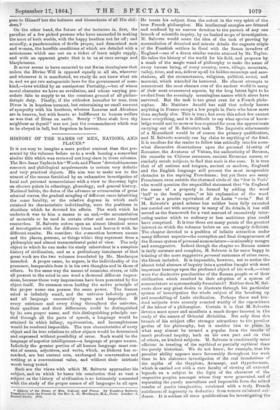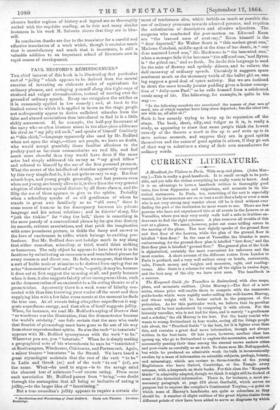HISTORY OF THE NAMES OF MEN, NATIONS, AND PLACES.* IT
is not easy to imagine a more perfect contrast than that pre- sented by the volumes before us to a work bearing a somewhat similar title which was reviewed not long since in these columns. The Rev. Isaac Taylor in his " Words and Places " devoted immense research and philological acquirements to certain very definite and very practical objects. His aim was to make use to the utmost of the means furnished by an exhaustive investigation of local and personal nomenclature with a view to throwing light on obscure points in ethnology, glossology, and general history. National habits, the dates of the advance or retrocession of great ethnical waves, the gradual mingling of different races inhabiting the same locality, or the relative degrees in which each retained its characteristic individuality, were the problems to elucidate which he devoted his efforts. The work which he undertook was to him a means to an end,—the accumulation of materials to be used in certain other and more important researches. M. Salverte enters upon an almost identical arena of investigation with far different ideas and leaves it with far different results. He considers the connection between names and the places, persons, or things which they represent from a philosophic and almost transcendental point of view. The only object to which he can make his study subservient is a complete history of civilization, and as a preliminary instalment of that great work are the two volumes translated by Mr. Mordacque intended. A proper name, he argues, is the individuality of the possessor, inseparable from it in his own thoughts and in those of others. In the same way the names of countries, rivers, or bills all present to the mind in one word a thousand different impres- sions, because those very impressions have been presented by the object itself. No common noun lacking the active principle of the proper name can possess the same power. The human mind is infinitely small, and the universe infinitely great, and all language necessarily vague and imperfect. If every existence and every thing throughout the universe, their qualities and their differences, could be distinguished by its own proper name, and this distinguishing principle car- ried through all the parts of speech, a language would be attained in which fallacy, equivocation, and incompleteness would be rendered impossible. The true characteristics of every object and its true relations to other objects would be determined and expressed without possibility of error. Such would be the language of superior intelligences—a language of proper names. Infinitely the greater portion of all human language must con- sist of nouns, adjectives, and verbs, which, as Diderot has re- marked, are but current coin, exchanged in conversation and writing at a conventional value, and without their intrinsic worth being tested.
Such are the -views with which M. Salverte approaches his subject, and on which he bases his conclusion that so vast a subject as the history of civilization is so intimately connected with the study of the proper names of all languages in all ages.
• History of the Names of Men, Nations, and Places. By Eusebitte Salverte. 7'ranelated from the French by the Rev. L. H. Mordacque, M.A., OrOn. London: J. Russell Smith. 1864.
He treats his subject from the outset in the very spirit of the true French philosopher. His intellectual energies are fettered and confined by no narrow devotion to the pursuit of any one branch of scientific inquiry, by no limited scope of investigation. M. Salverte would scorn the idea of the task of proving by accumulation of detached and minute details the cognate origin of the Frankish settlers in Gaul with the Saxon invaders of England—one of a dozen similar results attained by Mr. Taylor. He takes the history of the world for his field, and proposes by a touch of the magic wand of philosophy to make the name of every human being, of every country, town, village, mountain, valley, river, and sea, deliver up all its hidden meanings and asso- ciations, all the circumstances, religious, political, social, and material, which attended its bestowal. He almost attempts to reconstruct the most obscure eras of the ancient world in many of their most evanescent aspects, by the long latent light to be evoked from the seemingly meaningless names which alone have survived. But the task is too great even for a French philo- sopher. Mr. Matthew Arnold has said that nobody knows anything in France except a few people in Paris who know more than anybody else. This is true; but even this select few cannot know everything, and it is difficult to say what species of know- ledge would not be more or less required for even the approximate carrying out of M. Salverte's task. The linguistic attainments of a Mezzofanti would be of course the primary qualification, and M. Salverte scarcely can lay claim to anything of the kind. It is needless for the reader to follow him critically into his some• what discursive dissertations upon the personal id entity of Zoroaster, the Avataras of Vishnu, the authenticity of Berosus, his remarks on Chinese surnames, ancient Etruscan names, or similarly occult subjects, to find that such is the case.- It is true that of all nations and tongues, ancient or modern, England and the English language still present the most insuperable obstacles to the aspiring Frenchman ; but yet there are many Frenchmen even outside the charmed circle of the "few in Paris who would question the unqualified statement that "in England the name of a property is formed by adding the word ' hall' to the family name," or his explanation of the word "hall" as a precise equivalent of the Latin "curia." But if M. Salverte's grand scheme has neither been fully executed nor carried out with accuracy in many of its details, it has still served as the framework for a vast amount of excessively inter- esting matter which no ordinary or less ambitious plan could have comprised. It is true there are many points of the greatest interest on which the volumes before us are strangely deficient. The chapter devoted to a problem of infinite attraction under many different aspects—the corruption and final disappearance of the Roman system of personal nomenclature—is miserably meagre and unsuggestive. Indeed though the chapter on Roman names is fairly accurate and complete, M. Salverte is far more happy in treating of the more suggestive personal surnames of other races, the Greek included. It is impossible, however, not to notice the almost total absence of inquiry into a question fraught with most important bearings upon the professed object of his work ,—what were the distinctive peculiarities of the Roman people or of their civilization which resulted in their adoption of a system of nomenclature so systematically formulated? Neither does M. Sal- verte show any great desire to illustrate through his particular system of investigation the whole subject of the breaking up and remodelling of Latin civilization. Perhaps these and kin- dred subjects were scarcely counted worthy of the expenditure of the labour of a philosopher. Certain it is that M. Salverte devotes more space and manifests a much deeper interest in the study of the names of Oriental divinities. Not only does this branch of his subject offer stronger attractions to the peculiar genius of his philosophy, but it enables him to place in what may almost be termed a popular form the results of much profound inquiry, both on his own part and on that of others, on kindred subjects. M. Salverte is considerably more efficient in treating of the mythical or partially mythical than the purely historical. We do not know, for example, that his peculiar ability appears more favourably throughout the work than in his elaborate investigation of the real foundations of the myths of the Gryphins, Arimaspi, and Hyperboreans, which is carried out with a rare faculty of viewing all external legends on a subject in the light of the character of the respective peoples amongst whom they were generated, and of separating the purely marvellous and impossible from the mixed results of poetic imagination, combined with a truly French subtleness of ingenuity in deduction from remote co:lateral evi- dence. It is seldom all these qualifications for investigating the
obscure border regions of history and legend are so thoroughly united with the requisite reading, as in this and many similar instances in his work M. Salverte shows that they are in him- self: In conclusion thanks are due to the translator for a careful and effective translation of a work which, though it contains much that is unsatisfactory and much that is inaccurate, is still a valuable addition to an important school of literature now in rapid course of development.































 Previous page
Previous page